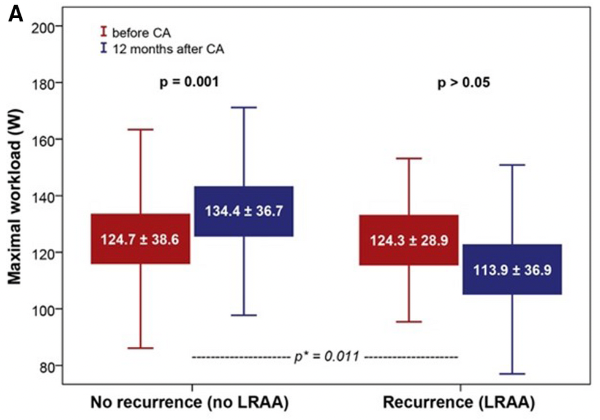AF and Cardio-pulmonary exercise testing

A cardiopulmonary exercise test (CPEX) measures cardiac and respiratory function whilst the participant exercises up to their maximum capacity.
A CPEX can be a useful tool for diagnosing heart and lung disease or working out why someone is breathless or quantifying fitness. It is commonly used by anaesthetists to assess a patient's fitness for extensive surgery e.g. transplantation or by Anthony Joshua to track his own fitness!

Breathlessness and exercise intolerance are two of the most common symptoms of atrial fibrillation (after palpitations). A CPEX allows the physician to evaluate the patient during an episode of symptoms (rather than when they're sat comfortably in the consultation room chair!). By measuring the performance of the heart, lungs, and muscles during exercise- you can see how much the heart function is contributing to any limitations.

CPEX has also helped us to more generally understand the impact of AF on cardiac function.
A study of 110 patients undergoing CPEX before and after their AF ablation showed an improvement in exercise capacity- but only in the patients who maintained sinus rhythm after their ablation. No significant improvement was seen in the patients who remained in AF. Interestingly, even amongst the patients who were in normal rhythm at their follow-up CPEX, those who showed no improvement were more likely to have a late recurrence of their AF. A limitation of this study is that many of the patients were poorly rate controlled when in AF before the ablation and so part of this may be explained simply by better heart rates during sinus rhythm.

In summary, we know exercise and weight control are important pillars in the control of Atrial Fibrillation. On an individual level, a CPEX may offer some clarity to the cause of breathlessness/exercise intolerance in AF patients if there's any uncertainty. On a more general level, its a useful way to study the impact of AF on the heart's response to exertion and may be a useful tool to predict longer term outcomes as well.

Of note- the CPEX test is used in the AFHF study to evaluate the change in heart function in heart failure patients undergoing AF ablation. We'll be analysing what insights we can learn from this test in patients who have these two conditions as it hasn't been published before- so watch this space!
